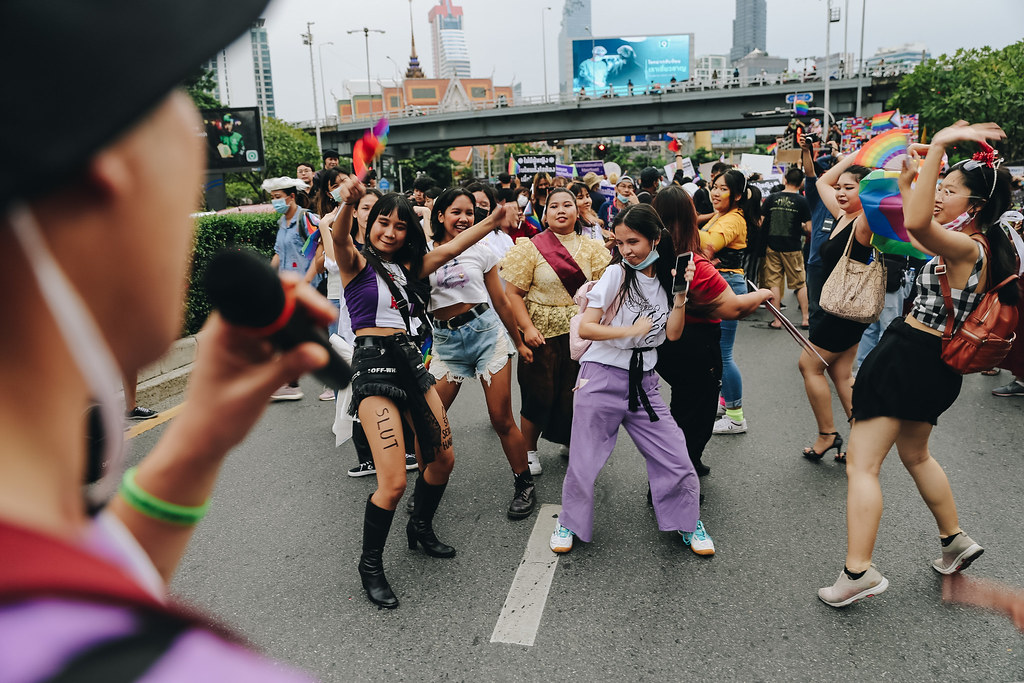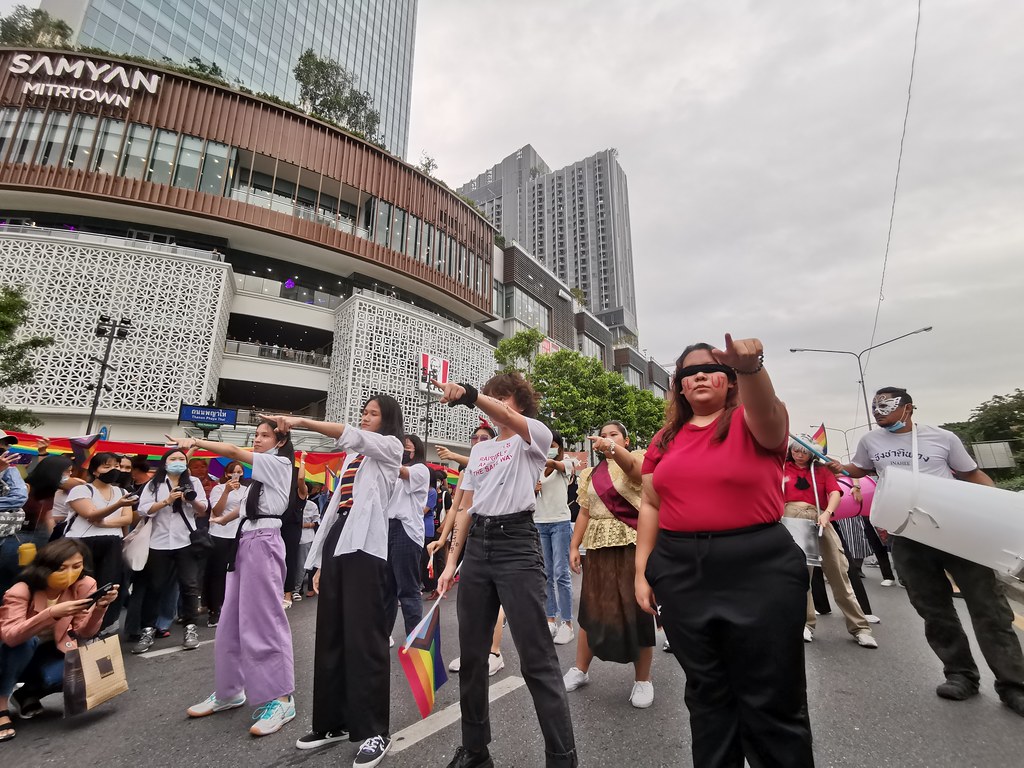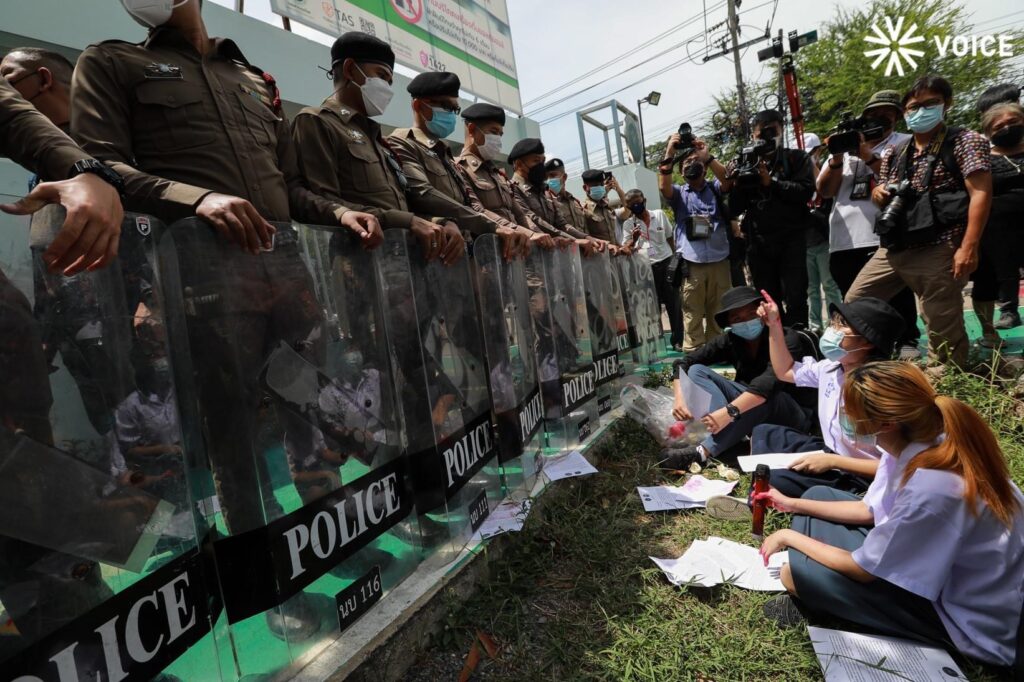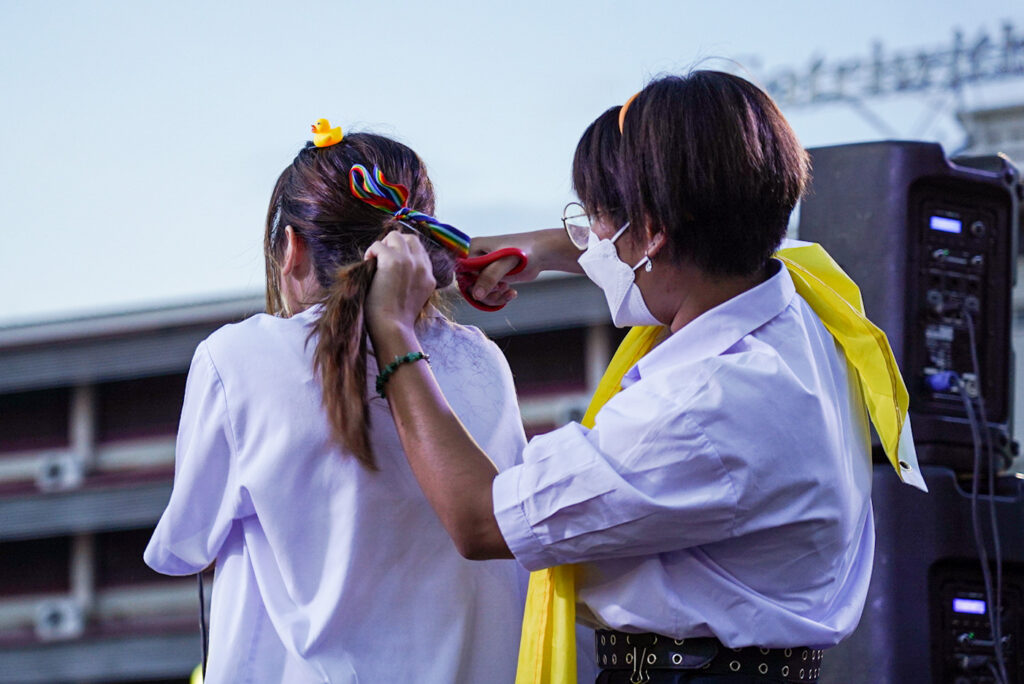Minds of the Movement
An ICNC blog on the people and power of civil resistance
by Nitchakarn Rakwongrit (Memee)September 10, 2024
This article is part of the REACT mini-series entitled, "Voices of Resilience: Women Defending Human Rights in Southeast Asia", guest-edited by Maneesh Pradhan and powered by ActionAid Denmark. Additional posts will be released in the coming weeks. Check back on our blog homepage!
Sign up for the October 16, 2024 launch webinar which will feature Voices of Resilience series authors.
I was born and raised in the northeastern region of Thailand, in a province known as Isan. I grew up in a society that identified as the "Red Shirts," a grassroots movement striving for political and economic democracy. When I turned 16, I left Isan to attend high school in Bangkok. It was during this time that I was introduced to feminism and began reading about the struggles faced by women and LGBTQ+ communities in their fight for self-affirmation and the recognition of their traumas.
Half a year later, in June 2020, the news broke about the disappearance of Wanchalerm Satsaksit, a Thai political activist, in Cambodia. As I read the news in shock, I noticed that people were organizing a protest at the Cambodian Embassy in response to the incident.
I had recently moved to Bangkok and was in the 11th grade, just 16 years old. I was unfamiliar with the city's routes and was living in my mother's friend's house. At that time, my mother and I had separated from my father and had barely anything with us.
Despite these challenges, I felt an overwhelming and unwavering conviction. The feeling was so powerful that I can still describe it with the same sincerity to anyone: when I learned about the protest being organized, I knew I had to participate. If I didn't, I would forever regret it and be disappointed in myself for witnessing injustice and choosing to remain silent.

Thai rendition of "A Rapist in My Path." Credit: Author.
Women's liberation
In August 2020, I volunteered with the Women's Liberation group during the massive youth protests in Thailand. These protests had three main demands: the resignation of the military dictator, the drafting of a new constitution and the reform of the monarchy.
I faced my first legal charges for a speech I gave on October 25, 2020, at Ratchaprasong Road, advocating for the rights of women in prisons. At the time, I was 16 years old and became the seventh minor to be prosecuted. This marked my first encounter with the juvenile justice system, exposing its gaps, injustices and discriminatory practices.
Although we were charged under the Emergency Decree during the COVID-19 situation, it was clear that these charges were politically motivated, targeting those expressing political dissent. We were treated as ordinary criminal offenders, subjected to inappropriate questions about our sexual behavior, drug tests and inquiries into our family backgrounds in an attempt to find flaws or reasons to conclude that our political activism stemmed from a troubled upbringing. However, no one dared to acknowledge the real reason—that I engaged in political activism due to my political awareness and civic consciousness.
This case was the first juvenile case to be fought until a verdict was reached. During the witness examination and hearings, the questions posed were often disheartening. For instance, when I defended my right to free expression, the attorney tried her best to discredit my activism. She asked if I had read the entire Convention on the Rights of the Child. When I confirmed that I had, she asked if I had read the entire document in English and placed it on the table.
Despite the judge's pressure to accept diversion and the mentally exhausting and time-consuming hearings, we persevered. The court ultimately ruled in our favor, dismissing the charges on the grounds that we were exercising our right to peaceful assembly. The accusations that I had organized a gathering risking the spread of COVID-19 were also dismissed, recognizing that, as a youth, I was unlikely to have the capacity to manage such an event.

Thai rendition of "A Rapist in My Path." Credit: Author.

Protest demanding Covid-19 vaccines for youth at the Thai Ministry of Public Health (July 7, 2021). Credit: Voice TV, Thai news.
A rapist in your path (Sida lui fire)
After the Women's Liberation group changed its name to Feminist's Liberation Front Thailand to be more inclusive of all genders, a group of feminist friends came together one night to adapt the lyrics of "A Rapist in Your Path" ("Un violador en tu camino" in Spanish) from Chile. This powerful song was originally created to protest rape culture. We translated it into Thai and performed it through song and dance at protest sites, with the intention of integrating the fight for gender justice into mainstream democratic movements.
Leading the performance of "A Rapist in Your Path" faced significant backlash from society. We encountered resistance from anti-feminists and a lack of understanding from the public at that time. We became targets of men's rights groups and experienced online harassment.
Despite the backlash from a society unaccustomed to rape survivors speaking out, this event encouraged many survivors in Thailand to share their own stories of survival and experiences of harassment or sexual assault. It became a powerful movement online, reinforcing the message that victims are never at fault for the abuse they endure.
The most impactful line from the song was, "I can be as wild and free as I want, go wherever I please; it's you who raped me." This line, with its strong language, stood as a resolute declaration of solidarity with all victims. All of us who performed this song chose to remember the voices and strength of the survivors who spoke out.

Protest demanding Covid-19 vaccines for youth. Credit: Voice TV, Thai news.
Storming the ministry for vaccines
We organized a protest demanding quality vaccines for the youth, which led to a lawsuit filed against me by the spokesperson of the Ministry of Public Health. This protest and subsequent legal action subjected me to a more challenging juvenile justice process, where I felt personally targeted by those in power.
On the day I reported to the provincial police station, it became apparent that they had little experience handling cases involving politically active youth. My friends and I were taken to a room without a lawyer, where the police requested to take photos and asked for our ID cards, in violation of procedure. Recognizing this, we quickly sought out our lawyer. However, we ended up waiting in a conference room for nearly 10 hours due to the slow process at the police station.
The juvenile court process was even worse. To expedite the lengthy case, we agreed to accept diversion. As part of this process, the court required us to write an apology letter to the Minister of Public Health, clean a statue symbolizing the monarchy at the Ministry of Public Health, and polish police shields.
During the mediation, the spokesperson of the Ministry of Public Health, who was the plaintiff in the case, pressured us to bow in apology. Initially, we refused because his secretary had raised a camera to take pictures and we suspected that they intended to publish these images. We eventually succumbed to the pressure from both the plaintiff and the associate judge and bowed. As expected, the picture of us bowing was posted on the plaintiff's social media. We promptly informed our lawyer, and the court instructed the plaintiff to remove the post as it was deemed inappropriate. He complied and took it down.

Memee prepares to shave her head for democracy and justice in Thailand.
Shaving my head in protest
In 2021, as the protests started losing steam, I began feeling exhausted and burnt out from my activism. That's when I made the decision to shave my head in protest, as a final act on stage at a Feminist Liberation rally known as the "Naked Mob." This act garnered significant attention online, with many expressing their regret or suggesting that, as a woman, I should prioritize my hair and beauty. Even my father criticized me, calling it a foolish decision.
However, this act of self-expression successfully brought the issue of democracy back into the public discourse, if only temporarily. It also served as a powerful reminder of why I am passionate about activism and the importance of our cause.
From protests to prosecution
Between 2020 and 2022, I found myself involved in a series of legal cases because of my protests and activism. As a minor, I encountered five of these cases, with an additional two occurring after I reached adulthood.
During this time, I became a target of doxing by right-wing groups online. Shockingly, police reports publicly exposed my personal information, including my name, ID number and specific details regarding all the cases filed against me. Disturbingly, this sensitive information continues to circulate online, even to this day.
On the horizon
This journey exposed me to many experiences that helped me grow. I formed friendships and fostered deep connections, although our time together was often brief. One of my close friends had to flee the country for safety due to charges under Section 112, the lèse-majesté law. Unfortunately, some of my other friends either left the country, ended up in prison, lost their lives while incarcerated or made the difficult decision to cease their activism.
I endured these challenges because of those who believed in me and our cause. While many adults supported youth spaces, there were others who questioned our capability and awareness. Nevertheless, we remain committed to our actions. The struggle continues!

Nitchakarn Rakwongrit (Memee)
Nitchakarn Rakwongrit (Memee) is a young feminist activist based in Bangkok, Thailand. She became involved in the Thai pro-democracy protests in 2020 and has been actively engaged in activism ever since. Despite her young age, she has faced political prosecution in at least seven cases, with five occurring when she was still a minor.
Read More